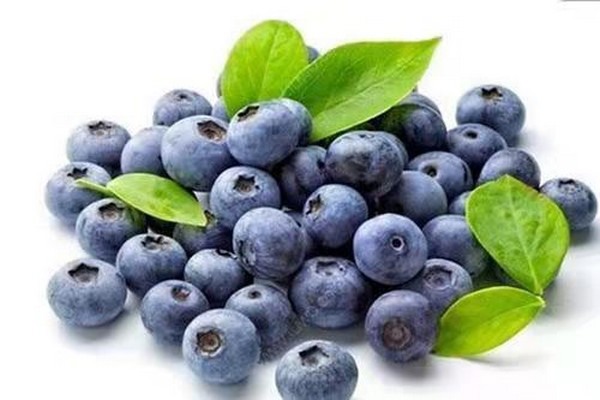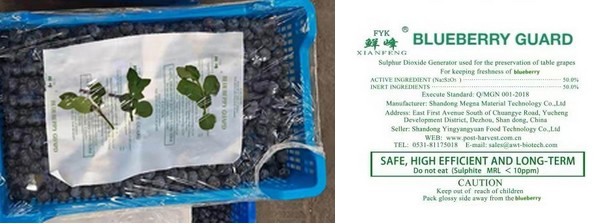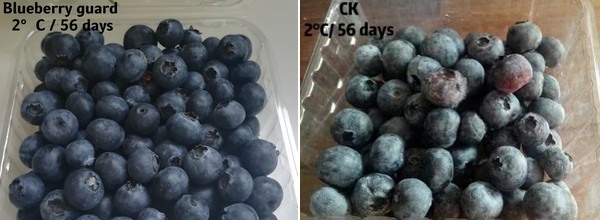Blueberries easily spoil. They are also frequently damaged during the processing stage of their supply chain, as well as in storage or during transport. Traders often have to dispose of blueberries that have become mouldy. This makes the transport, storage, and retail of blueberries extremely difficult.
Another issue is the limited shelf life of blueberries. They do not stay fresh for very long. Shandong AWT Bio-tech is an export company specialized in the development and production of products that keep fruit fresh. Manager Li recently introduced the company's new FYK preservation pads for blueberry products.

Manager Li first introduced the capabilities of the preservation pad, "sulphur dioxide is a highly efficient mould inhibitor. This is one of the active elements of our preservation pad. Sulphur dioxide is already widely applied and proven to work in the grape industry, but this method is not commonly seen in the blueberry industry. Our FYK preservation pad extends the shelf life of blueberries through the gradual release of sulphur dioxide."
When asked about the advantages of this product, manager Li replied, "the FYK preservation pad emits sulphur dioxide at a steady pace that can guarantee a stable concentration of the gas in the package. In addition, the preservation pad limits moisture in the package. The slow release of sulphur dioxide does not affect the colour or flavour of the blueberries, but can extend the shelf life by around 30%."

"Sulphur dioxide preservation was initially only used in the grape industry, but as the import volume and domestic production volume of blueberries increased, so did the number of people who came to our company with a need for blueberry preservation solutions. That is when we began to adjust the grape preservation pad for use in the blueberry industry. We implemented technological innovations and adjusted the concentration of sulphur dioxide to better suit the needs of blueberries. That is how we developed our FYK blueberry preservation pad," explained manager Li.
"In addition to differences in fruit varieties, such as grapes or blueberries, we also have to take into consideration differences between blueberry varieties and production areas. All of these factors influence the requirements for preservation. That is why we work closely together with our clients. All of our clients have unique, individual needs and we aim to reflect these needs in the design of our solutions."
Test results
The fresh blueberries were kept at 2°C for 56 days and the results were as follows for the blueberries with a preservation pad (left) and those in traditional packaging (right):

In addition to the research done by the Shandong AWT Bio-tech team, the company also cooperated with domestic research facilities. They continuously improve production technology and industrial processes to raise the effectiveness and efficiency of their preservation products. The company is registered in more than 32 countries including South Africa, Chile, and Australia, and is always looking for retailers interested in cooperation.
For more information:
Li - Manager
Shandong AWT Bio-tech Co., Ltd.
WhatsApp: +86 18615225880
WeChat: +86 18615220175
E-mail: sales@awt-biotech.com
Website: www.chinesepost-harvest.com
